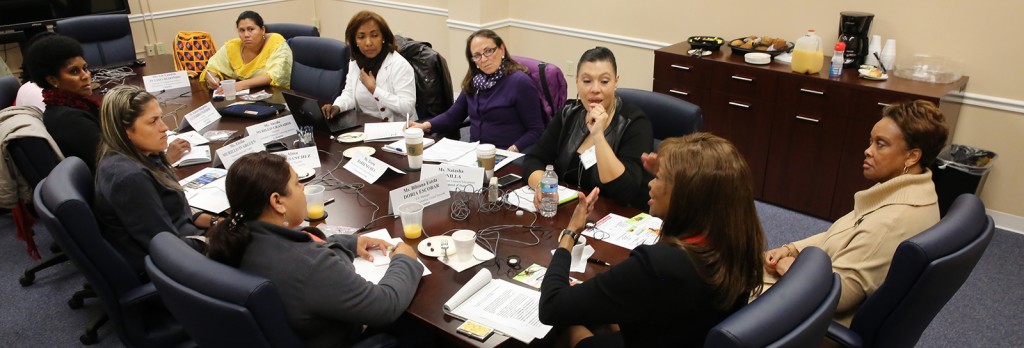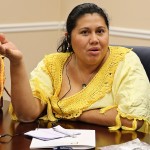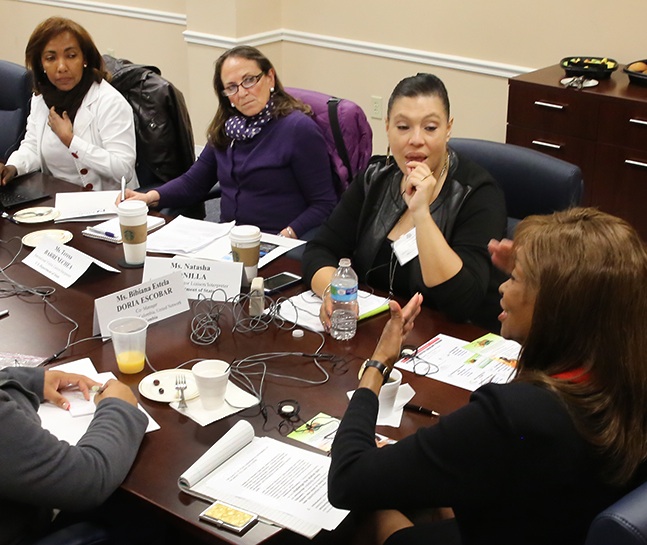A delegation of business and professional women from Colombia visited Jackson State University this week as part of the U.S. State Department’s International Visitor Leadership Program.

Shirley Harrison welcomed the six visitors on Tuesday to the JSU International Programs Office, where she is interim director, and turned them over to Dr. Priscilla Slade, special assistant to the provost for International Programs and Community Colleges.
With interpreters translating back and forth in English and Spanish, Slade spoke about women in leadership and lessons that must be learned.
The group included Dr. Alma Solano Sanchez, M.D., secretary of Health, District of Barranquilla; Bibiana Doria Escobar, head of an Afro-Colombian ethnic organization in Valencia, Cordoba; Kairen Margarita Gutierrez Tejedor, head of a black cultural group in San Basilio de Palenque, Cartagena; Aleyda Murillo Granados, president of Colombia’s National Learning Service; Isis Laudith Pulido Redondo, director of Indigenous Affairs in Riohacha, Guajira; and Elcilia Murillo, a business owner in Quibdo, Choco.
“A leader has to be a change agent,” said Slade, who served as president of Texas Southern University for seven years. No organization is without flaws, she said. So, a
leader must choose between “doing the job versus having the job.”

Actually doing the job may be unpopular, she said, but a leader must challenge the status quo.
“You must be a perpetual learner,” she said. Your job skills and accomplishments may have earned you a leadership position in an organization, but that’s only the starting point. What brought you to the job isn’t enough. “If you are going to lead, you must move beyond that.”
Making decisions may be unpopular, but actually doing the job requires it, she said. One must approach each day, believing “I want to do this job. I want to have a positive impact on this organization.”
To be an effective leader requires having a core group of people who share your vision, she told them. A good leader will always check behind to make sure there are followers, otherwise you are not leading. And a good leader will support his or her followers, allowing them to do the jobs they are entrusted to do.
You may not think you are a role model, she said, but by merely holding a position of leadership, people are watching you, remembering what you do and taking cues from your attitude, appearance, words and behavior.

She often visits Houston, Texas, she said, and strangers will walk up to her and say they remember when she was the school’s president, that her tenure had an impact on their lives.
Slade fielded a number of questions.
Granados asked Slade about the relationship between two-year colleges and four-year universities in America. Slade outlined cooperative agreements JSU has with community colleges that ease transition from one to the other.
Redondo said that she noticed that women in Jackson appear “very happy, very self-assured.” She complimented Slade on her force of character.
Murillo asked if it was difficult being a woman and an African-American woman in a leadership position.

Slade said that if you think of those attributes as obstacles, you will never get past them. She said she enjoys being a woman and being black. Besides, she said, these are things that she cannot change.
Rather, she said, look to things you can change, speak clearly, say what you mean and follow through.
“Your voice should carry power based on activities of the past,” she said.
The group also discussed building greater ties between JSU and universities in Colombia with faculty and students.
The delegation arrived in Jackson on Saturday, attended services Sunday at Greater Mt. Calvary Baptist Church, and met with Second District U.S. Rep. Bennie Thompson, D-Miss., Vicksburg Mayor George Flaggs, and Will Colom, an attorney.







